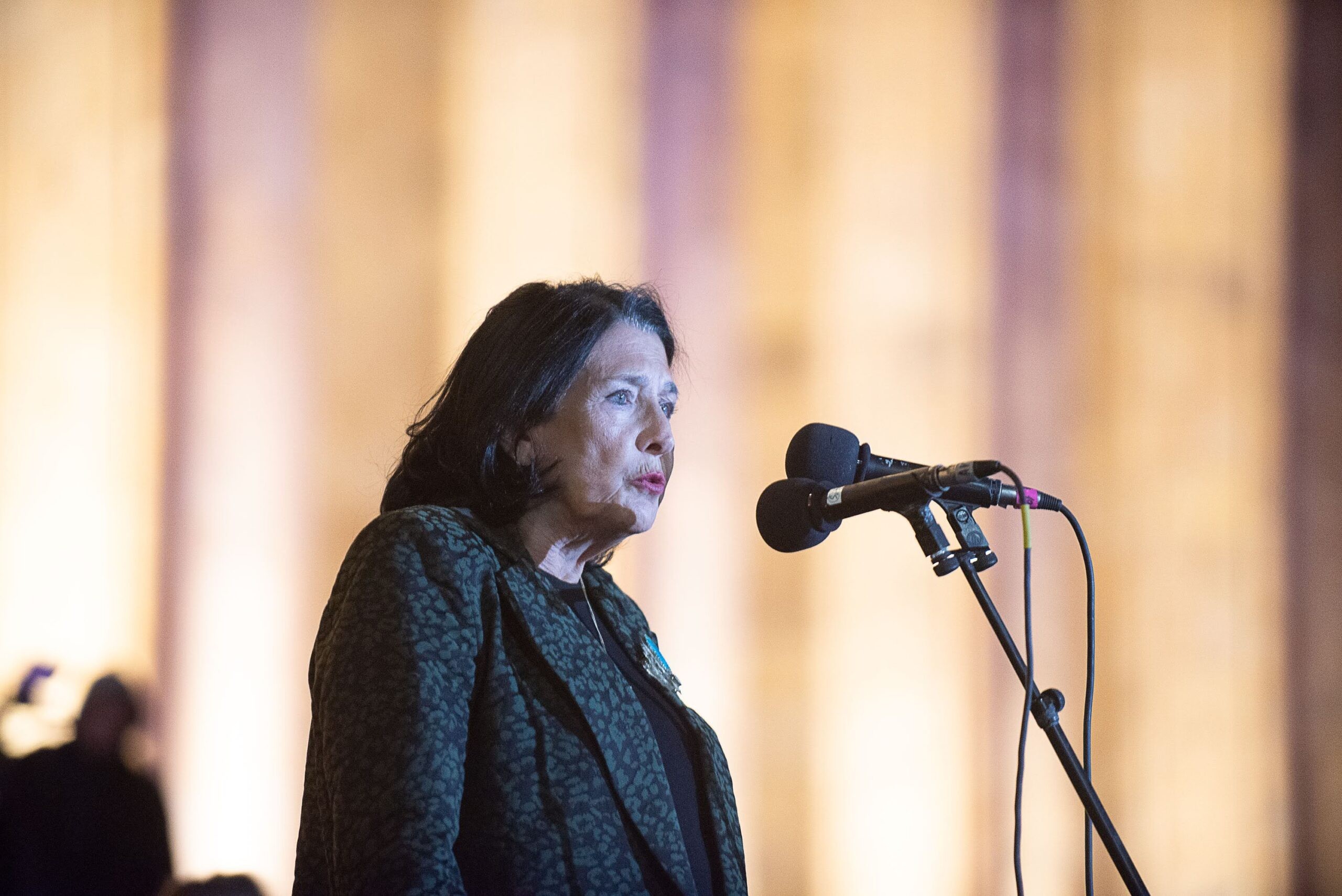Georgian president disputes October vote in court and calls for provisional government ahead of redo

Georgian President Salome Zourabichvili has proposed a repeat election, with the government, including herself, operating under holdover authority until the previous election results are nullified and a new parliament is voted in.
Zourabichvili appealed to the Constitutional Court to declare the 26 October parliamentary elections invalid on Tuesday.
She cited violations of two fundamental rights: ballot secrecy and the universality of suffrage, as she claimed that many Georgians abroad were unable to cast their votes.
[Read more: Diaspora Georgians ‘disenfranchised’ by barriers to voting abroad, observer group says]
‘Three weeks have passed, and none of our main democratic partners have recognised these elections. On the contrary, they emphasise the violations and are considering various measures of pressure. Therefore, the verdict is clear: these elections did not take place’, argued Zourabichvili.
After the 26 October election, only a few countries, including Armenia, Hungary, Iran, China, Russia, and allegedly Slovakia, extended formal congratulations to Georgian Dream on the results. Meanwhile, the US and most EU member states instead called on Georgian authorities to investigate the reported voting irregularities.
Hours before Zourabichvili’s announcement, EU foreign affairs chief Josep Borrell stated that the EU planned to send a mission to Georgia to look into irregularities in the country’s 26 October parliamentary elections.
[Read more: EU to send mission to Georgia to investigate electoral fraud]
During her announcement on Monday evening, Zourabichvili admitted she did not have faith in the independence of the court but said there was a need to ‘at least try and test the system’.
‘I hope […] there will be at least a few judges in the Constitutional Court who, as one judge has already shown, will prove that we still have honourable judges in this country’, Zourabichvili noted.
The Georgian president was apparently referencing a ruling by Vladimer Khuchua, a judge in the Tetritskaro Municipality, who on 4 November, nine days after the election, determined that electoral authorities had failed to ensure the secrecy of vote in several precincts. Khuchua invalidated results from dozens of local precincts only to be quickly overruled by the appeals court.
Zourabichvili also commended the demonstrations, and particularly the students taking part in them. Hours after her remarks, police forces broke up a protest encampment near Tbilisi State University, detaining 16 people.
[Read more: Georgian police move in on protest encampment in Tbilisi]
As demonstrators continued their protests near the original encampment, they criticised law enforcement agencies for using the university’s yard as a mobilisation point and condemned its management for allowing it.
Ruling party dismisses Zourabichvili’s roadmap to tackle ‘political instability’
On Monday evening, Zourabichvili urged the ruling party to reconsider its plan to inaugurate the new parliament on 25 November. Instead she proposed that Georgian Dream, the outgoing parliament, and she herself retain holdover authority until the results of the proposed redo of the parliamentary elections.
‘This notion of “I will convene the new parliament and appoint the government” — it’s entirely unserious when neither your own country nor your key partners stand with you’, Zourabichvili noted.
‘Let the outgoing parliament, the one from [elected in] 2020, remain in place, and let Mr Kobakhidze’s or another government carry on so that we can peacefully reach new elections. I believe they [Georgian Dream] should reflect on this, and I leave it for their consideration’, she said.
The president justified her offer by warning of the prospects of ‘political instability,’ which she vowed not to allow. But she also claimed it could arise from ‘dual power structures’, ‘external factors’ and ‘highly aggressive propaganda orchestrated by the government and its supporters’.
Without further elaborating, Zourabichvili mentioned the danger of parallel authority structures hours after meeting with several leaders of opposition groups, including Strong Georgia’s Mamuka Khazaradze. In the early hours of Monday morning, Khazaradze urged all opposition groups that crossed the 5% threshold to establish a ‘People’s parliament’ and invite Zourabichvili to serve as its ‘honorary chair’.
Shortly after Zourabishvili presented her anti-crisis proposal, it received support from opposition figures, including Khazaradze, Nika Melia of the Coalition for Change, and Giorgi Vashadze from Unity — National Movement. In contrast, Georgian Dream promptly rejected the proposal on Tuesday.
Georgian Dream’s Executive Secretary, Mamuka Mdinaradze, reaffirmed his party’s intention to convene parliament without her involvement.
The most feasible legal path for the 89 Georgian Dream-elected lawmakers to validate at least two-thirds of the parliament’s 150 members and initiate the new legislative term appears to depend on the mandates of all elected lawmakers remaining legally undisputed.
Critics of the Georgian judiciary have already raised the possibility that it might outright dismiss Zourabichvili’s case instead of deliberating on it. Georgian Dream has been pushing to inaugurate the new parliament in less than a week.









